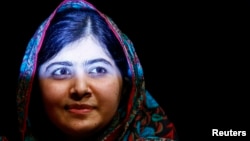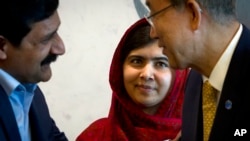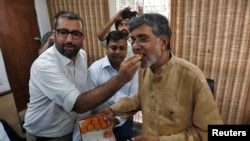The Nobel Peace Prize has been awarded jointly to Pakistani education activist Malala Yousafzai and Indian children right's campaigner Kailash Satyarthi.
In announcing the winners Friday, the Norwegian Nobel Committee said the prize was awarded for "their struggle against the suppression of children and young people and for the right of all children to an education."
Malala rose to fame after Taliban militants shot her at close range in the head for speaking out against the Islamic extremists and demanding education for girls.
Satyarthi has headed various forms of protests and demonstrations, all peaceful, focusing on the exploitation of children for financial gain. He also has helped develop important international conventions on children’s rights.
Congratulating the winners Friday, U.S. Secretary of State John Kerry said he thought the joint award was "terrific."
"I think the two of them together represent and incredibly appropriate statement about the importance of women and children," Kerry said.
In his speech Friday, Nobel Committee chairman Thorbjorn Jagland said the joint prize was symbolic because it was important for "a Hindu and a Muslim, an Indian and a Pakistani, to join in a common struggle for education and against extremism."
The award announcement follows a week of fighting between India and Pakistan across the border of the disputed region of Kashmir.
Malala, at a news conference Friday, expressed gratitude to be sharing the award with Satyarthi.
She said the two had spoken by phone and decided to collaborate not only on education issues but also on a push for peace between their nations.
Malala asked Satyarthi to request that Indian Prime Minister Narendra Modi attend the Nobel award ceremony in Oslo, Norway on December 10, while she promised to ask the same of Pakistan's prime minister, Nawaz Sharif. The two Nobel winners will receive medals and split the $1.1 million prize.
"This is not the end of my campaign," said the young activist, who was in a chemistry class when she learned of the honor. "I want to see every child going to school to get an education."
Malala said her message to children around the world is that they should stand up for their rights. She said she accepted her award on behalf of "all those children who are voiceless."
Satyarthi, in an interview with VOA's Urdu Service, said the award acknowledged the pain and suffering of millions of children working as bonded laborers.
Undeterred by bullets
Malala's hometown of Mingora in Pakistan's Swat Valley was infiltrated by militants from Afghanistan more than six years ago and for a time the community was living under the influence of the Pakistani Taliban. The Taliban set up courts, executed residents and closed girls' schools, including the one that Malala attended.
Under a pen name, she began writing a blog about the harsh living conditions under Taliban rule.
On October 9, 2012, Taliban gunmen fired on Malala's school bus, shooting her in the head and neck and wounding two of her classmates.
She was treated in Pakistan and later in Britain, where doctors mended parts of her skull with a titanium plate. She recovered enough to celebrate her 16th birthday last year with a passionate speech at the United Nations in New York, in which she appealed for compulsory free schooling for all children.
Malala told U.N. Secretary-General Ban Ki-moon and nearly 1,000 students attending an international Youth Assembly at U.N. headquarters that education was the only way to improve lives.
"Let us pick up our books and our pens," she said. "They are our most powerful weapons. One child, one teacher, one book and one pen can change the world. Education is the only solution. Education first.”
Malala has gone on to make several public appearances and has received a number of honors. In September 2013, she was given the Clinton Global Citizens Awards at a ceremony in New York.
Satyarthi fights to protect child laborers
Malala’s co-winner, Satyarthi, has campaigned for children’s rights in India for many years. He and other activists raided factories and other facilities to free children who were held in slave labor conditions. They also started an organization to educate the children and help them integrate into society.
"It's a great honor for all those children who are deprived of their childhood globally," Sayyarthi said upon receiving the news. "It's an honor to all my fellow Indians who have got this honor. It's not just an honor for me. It's an honor for all those who were fighting against child labor globally."
Born in Vidisha, India, in 1954, the husband and father of two gave up his career as an electrical engineer to concentrate on freeing children from slave labor. He also advocates for the right of all children to an education.
Satyarthi founded the New Delhi-based Bachpan Bachao Andolan, or Save the Childhood Movement, which fights child labor, child trafficking and child servitude. He heads the Global March Against Child Labor, a network of 2,000 civil society organizations and trade unions in 140 countries.
He also has led various forms of peaceful protest against exploiting children for financial gain.
The Nobel Prize, he said, means "people will give more attention to the cause of children in the world."
Strategic recognition
Satyarthi and Malala both work on behalf of children, and they work in neighboring countries. But their countries have a deep mutual mistrust, and there have been several deadly border clashes this week.
The juxtaposition was not lost on Mustafa Kadri, South Asia specialist at the Human Rights organization Amnesty International.
"My feeling, personally, is the Nobel Committee is sending a message, which is to say that both India and Pakistan have a shared destiny," he said. "They have the same sorts of challenges. They have very similar activists fighting for a better future for the children of these countries."
Kadri and other experts pointed out Friday that while giving the Nobel Peace Prize to two children’s rights advocates is a tribute to the work they have done, it is also a statement about how much more work there is to do.
VOA's Al Pessin and Selah Hennessy contributed to this report. Some material also came from Reuters.










